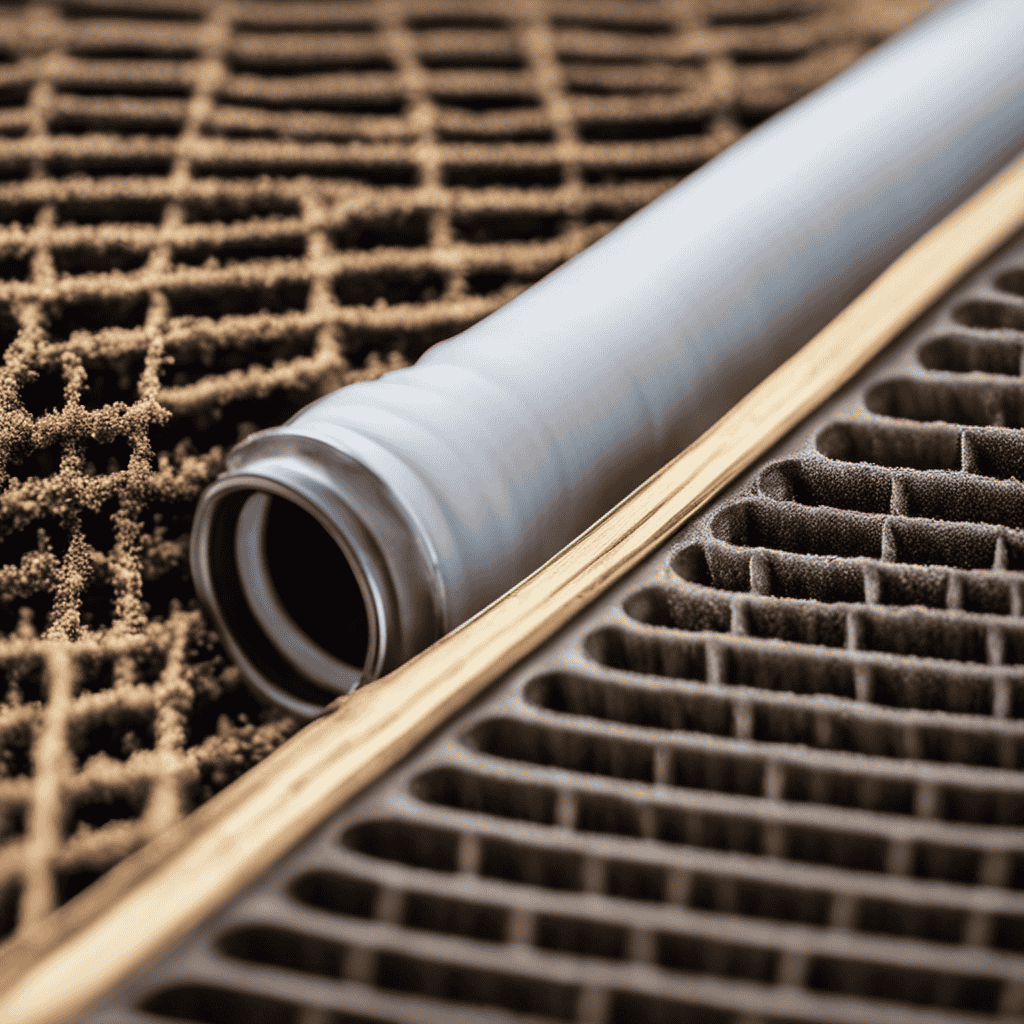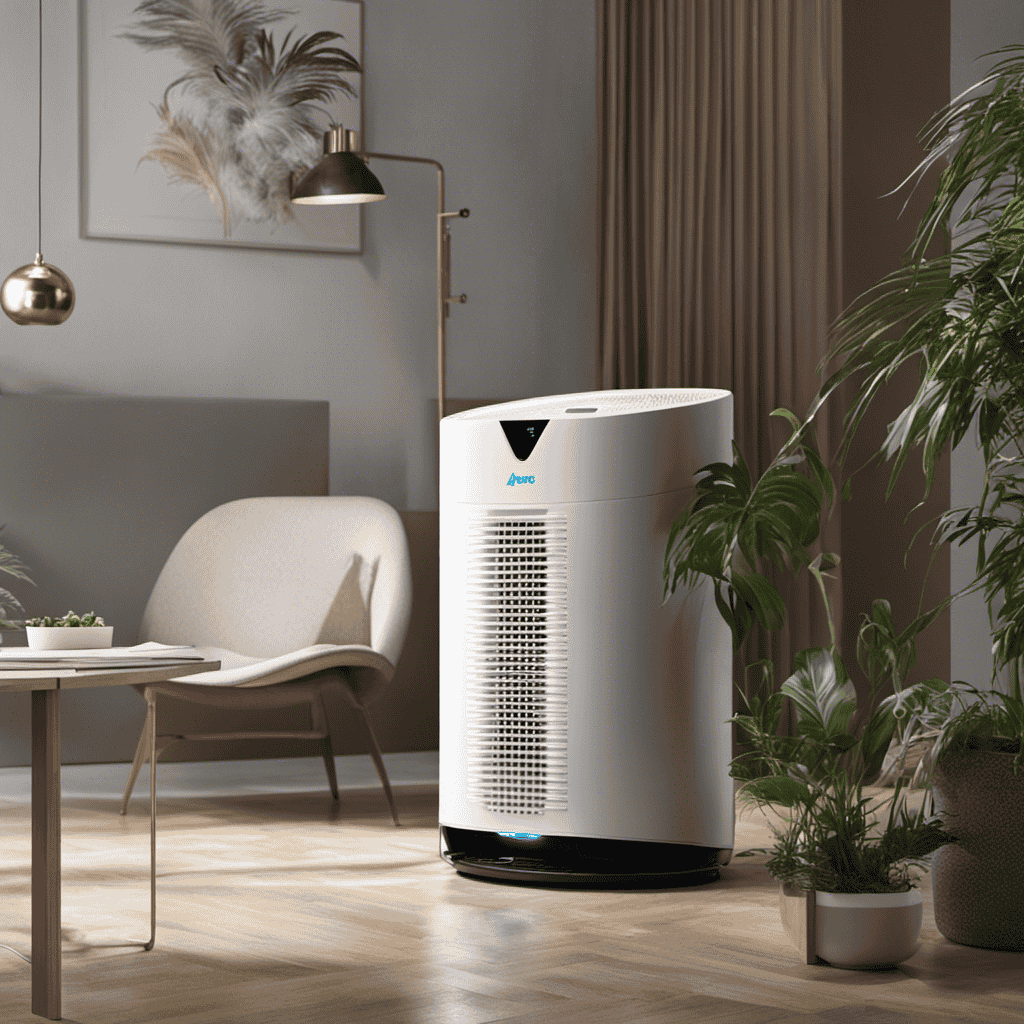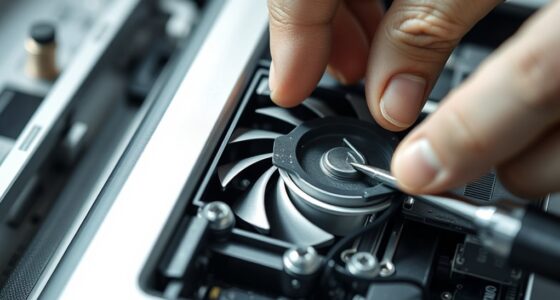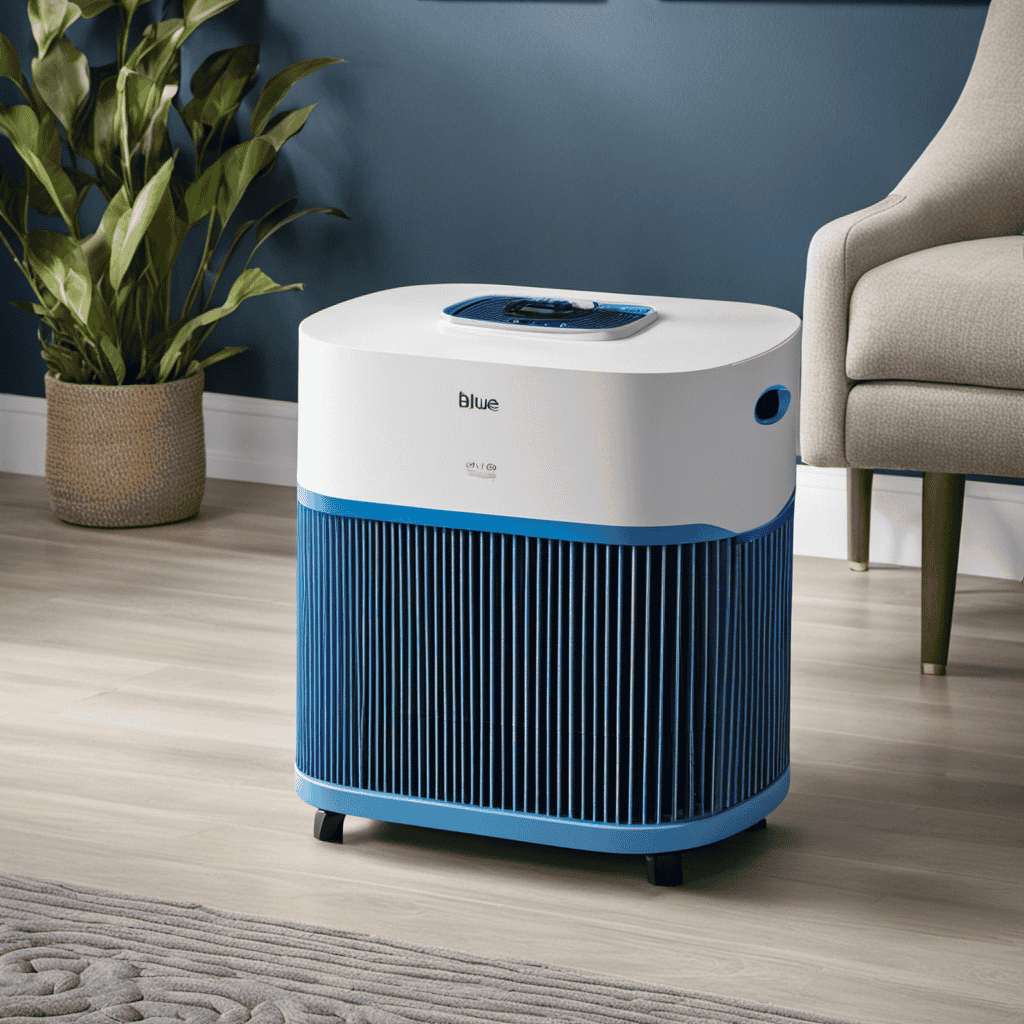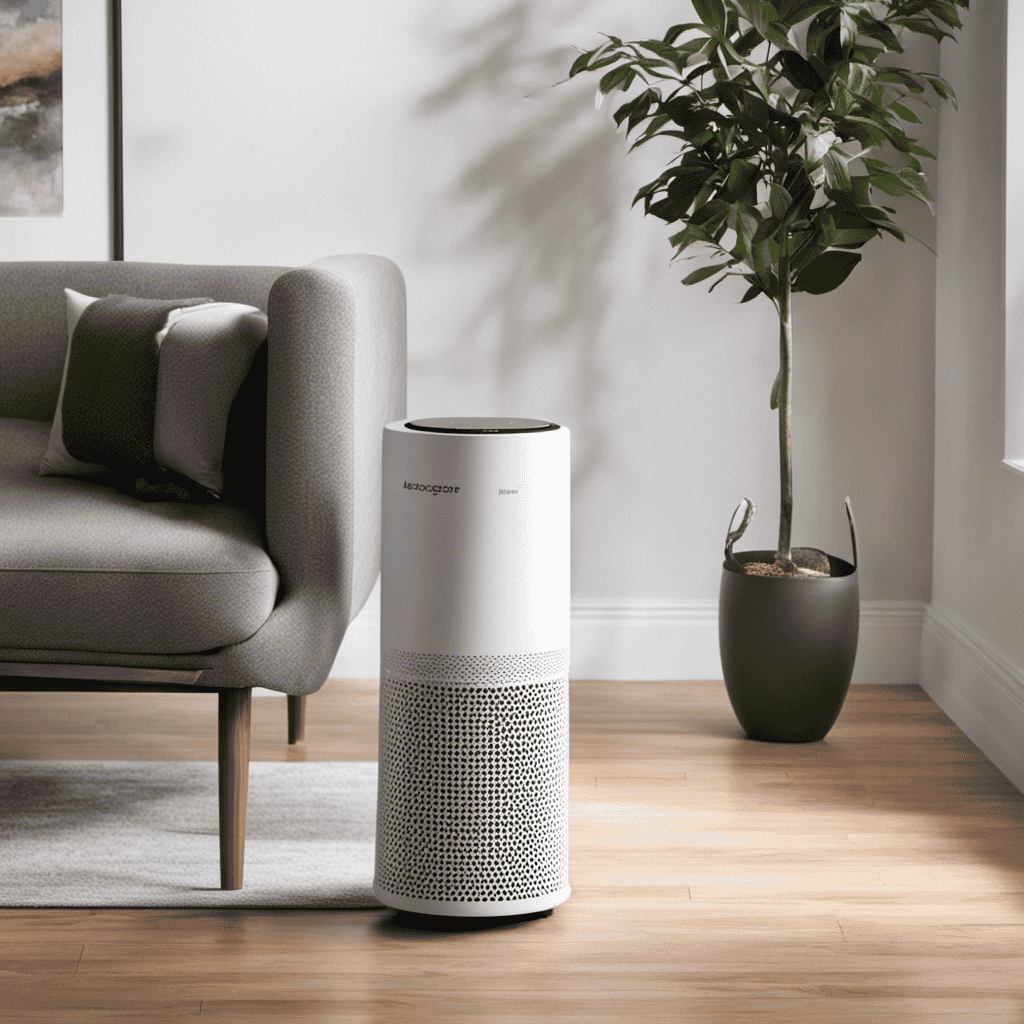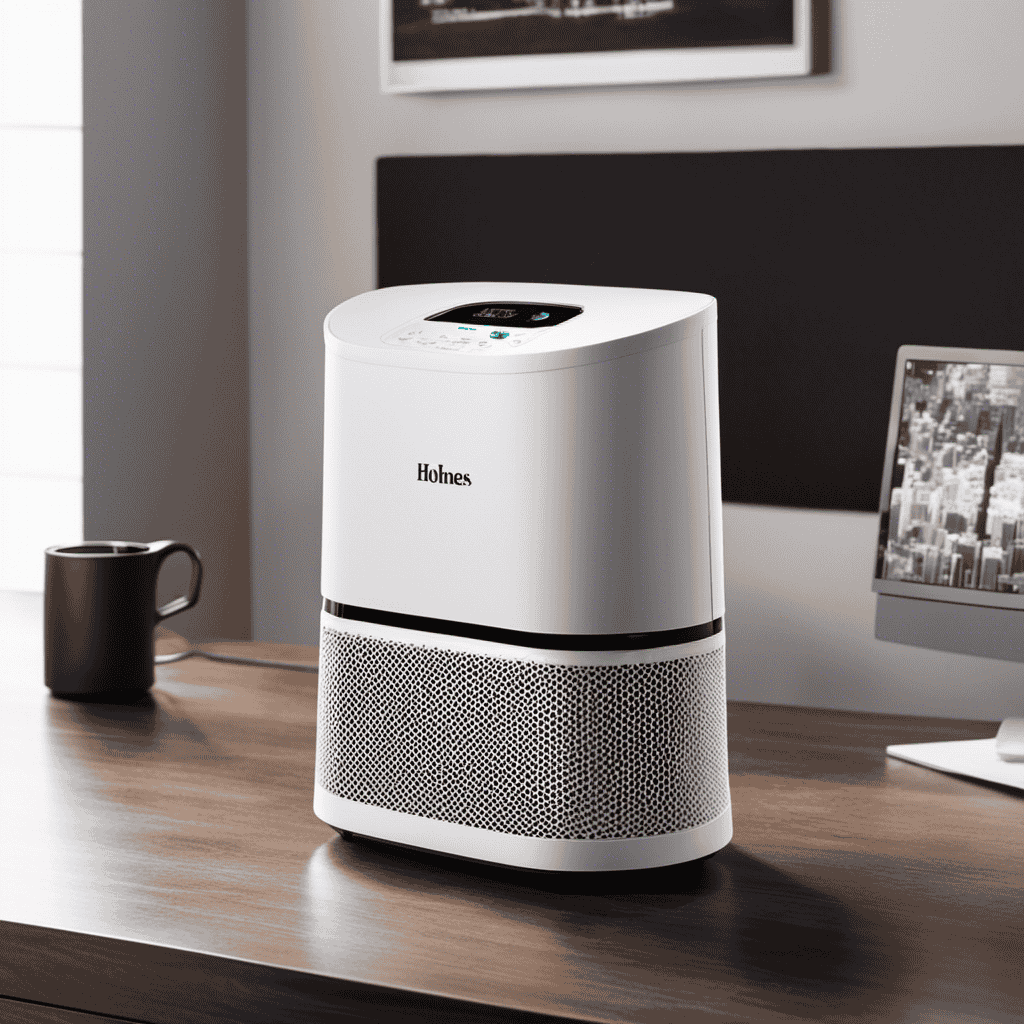As someone knowledgeable in air quality, I can confirm the significance of routinely changing your air filter. Having clean, fresh air is crucial for upholding a healthy living space.
But how long can you go before swapping out your air filter in your air purifier? In this article, we will delve into the factors that affect air filter lifespan, provide a recommended replacement schedule, and offer tips on extending the filter’s longevity.
Don’t let your indoor air quality suffer – let’s explore the ins and outs of air filter maintenance together.
Key Takeaways
- Air filter lifespan and replacement schedule is influenced by factors such as air quality, type of filter used, frequency of use, presence of pollutants or allergens, and the efficiency rating of the filter.
- Signs that indicate the need for air filter replacement include reduced airflow, increased dust in the home, poor air quality, the size of the HVAC system, and the type of filter being used.
- Regular air filter replacement every 3 to 6 months is recommended for optimal performance, and factors such as air quality, presence of pets, dust, and allergens can affect the frequency of replacement.
- Extending the lifespan of air filters can be achieved through regular cleaning or replacement of pre-filters, vacuuming or dusting the exterior of the air purifier, checking filter indicator lights or timers, using filters with higher MERV ratings, and placing the air purifier in locations with less dust and pollutants.
Factors Affecting Air Filter Lifespan
You should consider various factors when determining how long before you replace the air filter in your air purifier. Factors influencing filter efficiency include the air quality in your environment, the type of filter you are using, and the frequency of use.
If you live in an area with high levels of pollutants or allergens, your filter may become clogged faster and require more frequent replacement. Additionally, the type of filter you choose can affect its lifespan. Some filters are designed to last longer and have higher efficiency ratings.
Regular filter maintenance is crucial for optimal performance and longevity. By regularly cleaning or replacing your air filter, you can ensure that your air purifier functions effectively and efficiently.
With these factors in mind, let’s now explore the recommended air filter replacement schedule.
Recommended Air Filter Replacement Schedule
The recommended schedule for replacing the air filter in an air purifier is typically every 3 to 6 months. Regular filter replacement is essential to maintain optimal performance and ensure clean air in your home.
Factors affecting filter efficiency, such as air quality, usage, and the presence of pets or smokers, can shorten the lifespan of the filter. Timely filter replacement offers several benefits, including improved air quality, reduced allergens and pollutants, and increased efficiency of the air purifier.
By replacing the filter on schedule, you can enjoy cleaner, fresher air and extend the lifespan of your air purifier.
Now, let’s discuss the signs that indicate your air filter needs replacement.
Signs That Your Air Filter Needs Replacement
If you’re noticing reduced airflow or an increase in dust around your home, it may be time to replace the air filter. There are several factors that can affect the frequency at which you need to replace your air filter.
One of the main factors is the quality of the air in your environment. If you live in an area with high pollution or if you have pets, your air filter may become clogged more quickly. Additionally, the size of your HVAC system and the type of filter you are using can also impact the replacement frequency.
Signs of filter deterioration include visible dirt and debris on the filter, a musty odor coming from your vents, and decreased air quality. Understanding these signs and factors can help you determine when it’s time to replace your air filter and ensure that your home has clean and fresh air.
Moving on to understanding air filter lifespan…
Understanding Air Filter Lifespan
As an expert in air filtration systems, I can provide valuable insights into the optimal filter replacement frequency and effective ways to extend filter lifespan. Understanding these key points is crucial for maintaining clean and healthy air in your environment.
Optimal Filter Replacement Frequency
You should consider replacing the air filter in your air purifier every 3 to 6 months for optimal performance. Regular maintenance of your air filter is crucial to ensure clean and healthy air in your home.
There are several factors that can affect the frequency of filter replacement, such as the quality of air in your environment, the presence of pets, and the amount of dust and allergens in the air.
By replacing your air filter regularly, you can experience the following benefits:
- Improved air quality: A clean air filter can effectively remove pollutants, allergens, and odors from the air, providing you with fresh and clean indoor air.
- Enhanced efficiency: A clean air filter allows your air purifier to work at its maximum capacity, ensuring efficient air circulation and filtration.
- Prolonged lifespan: Regular filter replacement helps extend the lifespan of your air purifier by preventing clogs and reducing strain on the system.
Signs of Filter Deterioration
To ensure optimal performance, it’s important to regularly check for signs of filter deterioration in your air purifier. Proper filter maintenance is crucial for maintaining clean and healthy air in your home or office.
A deteriorated filter can lead to poor air quality and a decrease in the efficiency of your air purifier. One of the first signs of filter deterioration is reduced air flow. If you notice that your air purifier is not circulating air as effectively as before, it may be time to replace the filter.
Another sign to look out for is an increase in dust and allergens in the air. A clean filter helps to trap these particles, so if you notice an increase in sneezing or allergy symptoms, it is a good indication that your filter needs replacing.
Regular filter maintenance not only ensures optimal performance but also provides the benefits of clean air for you and your loved ones.
Extending Filter Lifespan
Regular maintenance is key to prolonging the life of your filter and ensuring optimal performance of your air purifier. By following these maintenance tips, you can extend the durability of your filter and maximize its lifespan:
- Clean or replace the pre-filter regularly to prevent larger particles from clogging the main filter.
- Vacuum or dust the exterior of the air purifier to remove any debris that may affect its airflow.
- Check the filter indicator light or timer to determine when it’s time to clean or replace the filter.
To further extend your filter’s lifespan, consider using a filter with a higher MERV rating, which can capture smaller particles and reduce the strain on the filter. Additionally, placing the air purifier in a location with less dust and pollutants can help minimize the accumulation on the filter.
Extending the Lifespan of Your Air Filter
If you want to extend the lifespan of your air filter, it’s important to regularly clean or replace it. By taking proper care of your air filter, you can increase its longevity and ensure that it continues to effectively remove pollutants from the air in your home or office. Cleaning your air filter is a simple process that involves removing it from the air purifier and gently washing it with water and mild soap. However, not all air filters can be cleaned and may need to be replaced instead. To determine whether your air filter can be cleaned or needs to be replaced, refer to the manufacturer’s instructions or check the filter’s specifications.
Here is a table that provides a visual representation of the different methods for extending the lifespan of your air filter:
| Method | Description |
|---|---|
| Regular Cleaning | Gently washing the air filter with water and mild soap to remove dust and dirt. |
| Replacement | Completely replacing the air filter with a new one when it becomes too dirty or clogged. |
| Air Purifier Maintenance | Regularly maintaining the air purifier itself, such as cleaning the unit and changing the pre-filter, to help prolong the lifespan of the air filter. |
Choosing the Right Replacement Air Filter
When it comes to choosing the right replacement air filter for your air purifier, there are several key points to consider.
First, you’ll want to understand the lifespan and effectiveness of the filter. Different filters have different lifespans and levels of effectiveness, so it’s important to know how long they will last and how well they will clean your air.
Additionally, there are different types of filters available, such as HEPA filters, activated carbon filters, and ionizers, each with their own benefits and drawbacks.
Filter Lifespan and Effectiveness
To maximize the effectiveness of your air purifier, you should regularly check the lifespan of the filter. The lifespan of an air filter can vary depending on several factors that affect its effectiveness. Regular filter maintenance offers numerous benefits, including:
-
Improved air quality: Regularly changing the filter ensures that it can effectively capture and remove airborne particles, such as dust, pollen, and pet dander, resulting in cleaner and healthier air in your home.
-
Enhanced system performance: A clean filter allows for better airflow, preventing strain on the air purifier’s motor and improving its overall performance and energy efficiency.
-
Prolonged filter life: Regular maintenance, such as cleaning or replacing the filter, can extend its lifespan, saving you money in the long run.
By understanding the factors that affect filter effectiveness and the benefits of regular maintenance, you can ensure that your air purifier operates at its best.
Now, let’s explore the different types of filters available.
Different Filter Types
Now that we’ve covered the benefits of regular maintenance, let’s take a look at the various types of filters available for your air purifier.
Different filter materials offer unique advantages for improving indoor air quality. One common type is the activated carbon filter, which effectively removes odors, gases, and volatile organic compounds (VOCs). These filters are made from activated carbon granules or fibers, which have a large surface area for adsorption.
Another popular option is the HEPA filter, which stands for High-Efficiency Particulate Air. HEPA filters are capable of capturing 99.97% of particles as small as 0.3 microns, including pollen, pet dander, and dust mites.
Additionally, electrostatic filters use an electric charge to attract and capture airborne particles.
Each filter material has its own strengths, so choosing the right one depends on your specific needs and the benefits you seek from your air purifier.
Regular Maintenance Schedule
Make sure you regularly clean and replace the filters in your air purifier to maintain optimal indoor air quality. Understanding filter efficiency and the benefits of regular filter cleaning are crucial for ensuring that your air purifier functions effectively. Here are three key points to consider:
-
Filter Efficiency: Different filters have varying levels of efficiency in removing pollutants from the air. It is important to understand the efficiency rating of your air purifier’s filters to ensure they can effectively capture and trap particles, allergens, and pollutants.
-
Improved Air Quality: Regularly cleaning and replacing filters helps to maintain clean and fresh indoor air. By removing dust, pollen, pet dander, and other contaminants, you can reduce the risk of allergies, respiratory issues, and other health problems.
-
Longer Lifespan: Proper maintenance of filters extends their lifespan and ensures the longevity of your air purifier. Regular cleaning and replacement prevent clogs and damage, allowing the purifier to operate at its best performance for a longer period.
DIY Air Filter Replacement Guide
You’ll want to replace the air filter in your air purifier every 3 to 6 months. Regular filter maintenance is crucial for optimal performance and clean air quality.
One of the options for maintaining your air filter is to clean it yourself using a DIY method. DIY air filter cleaning involves removing the filter from the purifier and gently washing it with water and mild soap. Be sure to let it dry completely before reinstalling it.
Regular filter maintenance offers several benefits. Firstly, it improves the efficiency of your air purifier by ensuring proper airflow. Secondly, it helps to remove pollutants, allergens, and odors from your indoor environment. Lastly, it prolongs the lifespan of your air purifier, saving you money in the long run.
How to Properly Dispose of Used Air Filters
When it comes to disposing of used air filters, it’s important to follow proper guidelines to ensure environmental safety. Improper disposal methods can have a significant environmental impact, causing pollution and harm to ecosystems.
To ensure proper disposal, consider the following methods:
-
Recycling: Many air filters can be recycled, especially those made of paper or cardboard. Look for recycling centers or programs that accept air filters.
-
Manufacturer’s recommendations: Some air filter manufacturers provide specific instructions for disposal. Check the packaging or their website for guidance.
-
Local regulations: Research your local regulations regarding the disposal of air filters. Some areas may have specific guidelines or facilities for proper disposal.
Importance of Regular Air Filter Maintenance
Regular maintenance of your air filter is crucial for maintaining good indoor air quality and maximizing the efficiency of your HVAC system. Filter maintenance tips are essential to ensure that your air filter is working at its best.
The benefits of clean air filters are numerous. Firstly, they can help to reduce allergens, dust, and other airborne particles in your home, providing cleaner and healthier air for you and your family. Additionally, clean air filters can improve the overall performance of your HVAC system by allowing for better airflow and preventing clogs that could lead to system breakdowns.
By regularly maintaining your air filter, you can enjoy cleaner air and a more efficient HVAC system.
Now, let’s discuss the common mistakes to avoid when replacing air filters.
Common Mistakes to Avoid When Replacing Air Filters
One common mistake to avoid when replacing air filters is forgetting to check the filter size before making a purchase. This is a crucial step as using the wrong size filter can lead to reduced air quality and decreased efficiency of your air purifier.
To ensure a successful filter replacement, here are some other common air filter replacement errors to avoid:
-
Neglecting to clean or replace the pre-filter: The pre-filter is the first line of defense against larger particles, and if it becomes clogged or dirty, it can hinder the performance of the main filter.
-
Not following the manufacturer’s recommended replacement schedule: Each air purifier has a specific timeframe for filter replacement, and failing to adhere to it can result in decreased air purification and increased strain on the unit.
-
Using low-quality filters: Investing in high-quality filters is essential for effective air purification, as cheaper alternatives may not capture smaller particles or have a shorter lifespan.
The Impact of Dirty Air Filters on Indoor Air Quality
As an expert in indoor air quality, I’m well aware of the detrimental effects that poor air can have on our health.
Dirty air filters are a major contributor to poor air quality, as they fail to effectively remove pollutants and allergens from the air.
To maintain a healthy indoor environment, it’s crucial to regularly replace air filters according to the manufacturer’s recommendations.
Poor Air, Health Risks
It’s important to address poor air quality in order to minimize health risks. Airborne pollutants can have a significant impact on respiratory health, causing or exacerbating conditions such as asthma, allergies, and chronic obstructive pulmonary disease (COPD).
To fully understand the potential risks, consider the following:
-
Airborne pollutants: These include particulate matter, such as dust, pollen, and pet dander, as well as volatile organic compounds (VOCs) emitted by household products and furniture.
-
Respiratory health: Exposure to these pollutants can lead to respiratory symptoms like coughing, wheezing, shortness of breath, and even respiratory infections.
-
Long-term effects: Prolonged exposure to poor air quality may contribute to the development of chronic respiratory diseases and increase the risk of cardiovascular disorders.
Understanding the impact of poor air quality on respiratory health is crucial for taking appropriate measures to improve indoor air quality. One effective way to do this is by regularly replacing air filters in air purifiers.
Filter Replacement Recommendations
To ensure optimal performance, make sure to regularly change out your air purifier’s filters. The frequency of air filter replacement depends on various factors influencing its efficiency and lifespan.
These factors include the air quality in your environment, the type of filter you are using, and the manufacturer’s recommendations. Regular filter maintenance offers a range of benefits.
Firstly, it ensures that your air purifier continues to effectively remove pollutants from the air, improving the overall air quality. Secondly, clean filters help to prolong the lifespan of the air purifier itself, reducing the need for costly repairs or replacements. Lastly, regular filter changes prevent the accumulation of dust and debris, which can lead to reduced airflow and decreased performance.
Conclusion
In conclusion, maintaining a regular air filter replacement schedule is crucial for ensuring clean and healthy indoor air. By understanding the factors that affect air filter lifespan and recognizing the signs of a filter that needs replacement, you can effectively extend its lifespan and improve the overall air quality in your home.
Remember, a dirty air filter is like a thick fog, obstructing the flow of clean air and allowing harmful particles to linger. So, don’t underestimate the importance of proper air filter maintenance and avoid the pitfalls that come with neglecting this essential task.
